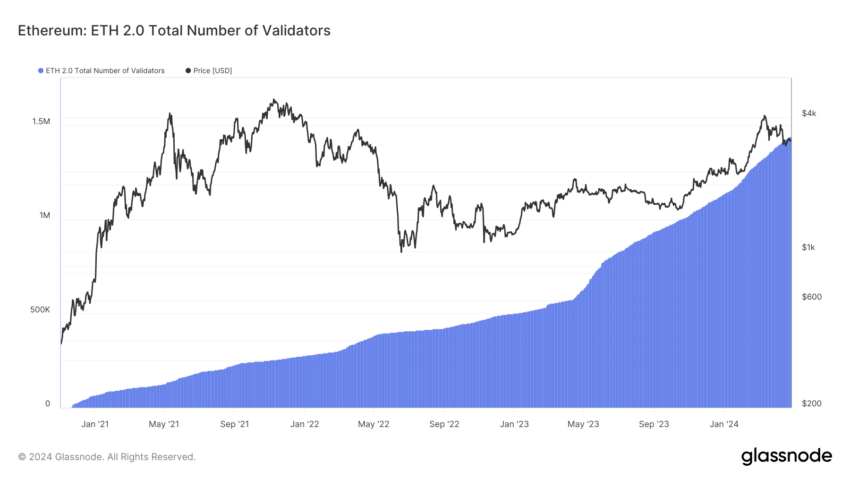Tensions between ConsenSys and the Securities and Exchange Commission (SEC) have escalated, sparking debate over the scope of their regulatory oversight.
The crux of the issue centers on the SEC's recent move to classify Ethereum, the world's second-largest cryptocurrency by market capitalization, as a security.
Lawsuit against Ethereum as security
ConsenSys argues that this regulatory attempt is an overreach that stifles innovation and harms developers, investors, and the wide range of institutions that rely on Ethereum's decentralized nature. Against this backdrop, the company took the decisive step of filing a lawsuit with the SEC. It challenges the authorities' authority to impose such a classification on Ethereum.
One of the central arguments presented by ConsenSys revolves around Ethereum’s transition from proof-of-work (PoW) to proof-of-stake (PoS). Contrary to popular belief, this change does not inherently turn Ethereum into a security, according to a ConsenSys spokesperson.
The spokesperson argues that the essence of what makes a digital asset a security, whether PoW or PoS, does not revolve around its consensus mechanism. Instead, you should focus on the diversification and nature of your assets. These aspects are robustly maintained in Ethereum's architecture.
Read more: Ethereum merging: everything you need to know

The move to PoS has actually made Ethereum even more decentralized. With the Merge upgrade, we now have over 1.44 million validators, allowing more participants to maintain and verify the network. This contradicts the SEC's insinuations that Ethereum's new model could centralize control, a point ConsenSys categorically refutes.
“Through Proof-of-Stake, anyone can participate in validating Ethereum, supporting the network, and maintaining the network. And you can do that by operating your own node, and you can do that through staking. Therefore, the idea that proof of stake will somehow lead to more centralization is incorrect,” a ConsenSys spokesperson told BeInCrypto.
Regulators contradict each other
The implications of the SEC’s decision to classify Ethereum as a security are serious. If Ethereum were to be considered a security, the impact on the U.S. market could be severe. Buying and selling Ethereum within the country may be prohibited.
This would isolate American investors and developers and place the United States at a significant disadvantage in the global digital economy.
“If the SEC has its way, I think all of this innovation will be eradicated and then the rest of the world will pass us by. That's not something we can tolerate. It's just cryptography. “It's something that the rest of the industry, or really anyone, should not tolerate because it's bigger than currency and blockchain. This is an attack on technology,” a ConsenSys spokesperson said.
ConsenSys also emphasizes that innovation, which currently thrives under the shadow of regulatory uncertainty, could reach new heights once these threats are alleviated. So this case isn't just about Ethereum, it's about protecting technological advances from misguided regulatory overreach.
The legal arguments presented by ConsenSys are largely based on historical precedent and definitions provided by the regulatory bodies themselves. Specifically, the company cites SEC Commissioner William Hinman's 2018 statement specifying that Ethereum is not a security.
“Aside from raising funds for the establishment, [Ethereum]Based on my understanding of the current situation, [Ethereum]the Ethereum network and its decentralized structure, current offers and sales [Ethereum] It’s not a securities transaction,” Hinman said.
Additionally, ConsenSys emphasizes the Commodity Futures Trading Commission’s (CFTC) consistent product classification of Ethereum and disputes the SEC’s contradictory positions.
What the outcome of the lawsuit means
If ConsenSys wins its case, the victory could set an important precedent. This could curb SEC involvement in areas such as cryptocurrencies and reinforce the need for a clear and consistent regulatory framework. Such a victory would bring much-needed clarity to Ethereum, strengthen confidence, and encourage further innovation and investment within the U.S. blockchain and digital asset sector.
Read more: Ethereum (ETH) Price Prediction 2024 / 2025 / 2030
The ongoing legal battle reflects a broader debate over the role and scope of regulatory bodies in emerging technologies. ConsenSys argues that the SEC should focus on its primary role of regulating securities, not software. The company advocates for a regulatory approach that fosters innovation, rather than stifling it under the weight of inadequate and overstretched regulatory frameworks.
“The SEC is a securities regulator, not a software regulator. Gary Gensler and the SEC have important work that needs to be done regarding real securities, so they should take action. They are distracted by this truly illegal move into the cryptocurrency space,” a ConsenSys spokesperson concluded.
As the legal process moves forward, ConsenSys’ challenge to the SEC is more than just a defense of Ethereum. This represents an important position for autonomy and advancement of the entire digital asset ecosystem.
Disclaimer
In accordance with the Trust Project's guidelines, this feature article presents opinions and perspectives from industry experts and individuals. Although BeInCrypto is committed to providing transparent reporting, the views expressed in this article do not necessarily reflect the views of his BeInCrypto or its staff. Readers should independently verify the information and consult a professional before making any decisions based on this content. Please note that our Terms of Use, Privacy Policy and Disclaimer have been updated.

